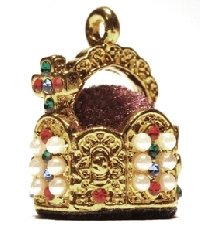Jewelry from around the world
By Catalogs Editorial Staff

Jewelry from around the world has interesting and amazing origins
Jewelry from around the world gives us a perspective into the personalities and habits of certain cultures. It helps us understand how and why sects of people behave and communicate in certain ways.Jewelry is a symbol of stature and classism in various cultures that place people in certain groups and hierarchies. The evolution of this process dates back many centuries in certain social circles, yet can be as current as modern times in others. For anything to transcend cultures and classes, it would have to be something that holds intrinsic value, is equally recognized among those cultures and carry with it a type of power and authority. Jewelry does that for cultures in a broad sense because of its rich history and origins and the impact that it has on society as a whole.
The purpose of jewelry
Jewelry is an item of personal adornment that many people use simply for adorning their bodies or clothing. It is one of the most popular methods that people use to enhance their appearance and clothing. Globally, men’s and women’s jewelry can be found in almost every culture and every form of organized society, be it wealthy or poor. It is also used as forms of communication and expression in many cultures, thereby increasing its power and influence with people. Often dubbed the second universal language (after love), jewelry from around the world has the ability to capture and connect people through emotions, through power and through its beauty.
Before you continue reading about the Jewelry from around the world there is a special announcement we would like to share with you. Catalogs.com has negotiated special medicare rates for our vibrant community of seniors. If you are over the age of 60, you can head over to our Seniors Health Section which is full of information about medicare. All you need is your zip code and a few minutes of your time to potentially save 100s of dollars on your medicare bills.
The word jewelry is derived from the 13th century Old French word, ?joule? and an even earlier Latin word, ?jocale? which means plaything. Early in the 13th century, jewelry was primarily used for adornment and entertainment purposes among the wealthier classes and those of authority. In later centuries, it evolved from its initial primary use to being used as a form of trade, bargaining and as a status symbol. Jewelry can originate from gold and silver, copper, wire or even art and can be used for various purposes.
Jewelry as commerce
In Africa, jewelry was used as a primary form of trade and still carries great historical meaning for their society. In the African culture, decorative glass beads called slave beads or trade beads were used as a source of currency exchange for goods, services and for slaves. These beads were made popular throughout Europe and are found today much throughout the United States, Canada and Latin America. The most commonly traded beads were Venetian beads called African trade beads and were produced by creating flowers or stripes from glass canes, then cut and molded into a core of a flat, solid color. Today, these slave beads are still manufactured but are used as items of adornment and self-expression by descendants of slaves.
The early Bronze Age introduced an ornamental clasp called a Fibula that was used by Romans, Greeks and Celts from that time period. These people were migratory tribes in Europe. The clasp was used to hold clothing together. Today, clasps and pins are used primarily for ornamental reasons.
Jewelry with religious significance
Jewelry from around the world also has a religious theme in certain cultures. The Western American culture uses the Christian crucifix jewelry as a symbolic portrayal of their devotion. This can be seen with people wearing fine jewelry like necklaces, bracelets and even rings signifying their religious preferences and beliefs. The Western practice of marital unity portrays couples exchanging rings, symbolizing their vows made to one another and denoting their social status.
The Jewish Star of David is another religious symbolic element that people of Jewish faith and descendants use as a reminder of their suffrage and devotion. It is a strong component of the Jewish faith that is highly revered. In the Roman Catholic Faith, a devotional medal is used to portray religious devotion from an individual and also holds significant meaning for the wearers.
The rich history and details surrounding the origin of jewelry and its meaning is quite engaging yet interesting. Knowing the full background of a piece of jewelry can instill confidence and pride in a group of people while for others can serve as a symbol of status and class.
Popular Savings Offers










.jpg)
.jpg)